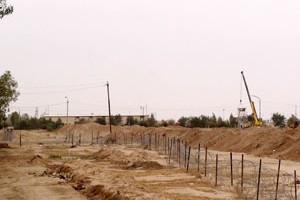 Amar Mahdi :
Amar Mahdi :
Three Iraqi military personnel were called in to appear before the Spanish National Court on 3 October in connection with the 8 April massacre at Camp Ashraf in the north east of Iraq in which 36 residents were killed. According to the writ, al-Maliki will be also be summoned automatically as soon as he steps down as prime minister and his judicial immunity is removed.
The Central Investigation Court Number Four of the Spanish National Court on July 11 ruled it would investigate the complaint against those responsible for the massacre that also left 350 wounded.
Maryam Rajavi, President-elect of the Iranian Resistance, said: “Al-Maliki must now put an end to the siege on Ashraf and all suppressive measures against Ashraf must stop.
“According to court ruling and based on the Fourth Geneva Convention, the US is obliged to stop torture and violence and must immediately take back the protection of Ashraf residents from the Iraqi government and the assailant forces in order to prevent another massacre,” said Rajavi.
The court has invited Ad Melkert, the Special Representative of the UN Secretary General for Iraq, and Struan Stevenson, President of the Delegation for Relations with Iraq of the European Parliament, to stand as witnesses.
The three accused military personnel are: Lieutenant General Ali Geidan, Commander of the Iraqi Ground Forces, who allegedly led the massacre under Maliki’s orders; Lieutenant Colonel Abdul-Latif al-Annabi, commander of the Iraqi battalion in Ashraf; and Major Jassem al-Tamimi.
This is the third ruling by the Spanish National Court in the past two years in relation to killings of Ashraf residents. Until now 47 residents, protected persons under the Fourth Geneva Convention, have been killed in these attacks. A total of 1,071 residents of the camp have been wounded by gunshots or hand grenades, or beaten by truncheons and batons, some have been run over by armoured vehicles. The Iraqi forces took 36 residents hostage in 2009 and kept them for 72 days. During the same period a number of Ashraf residents have died due to medical blockade of the camp.
On 26 November 2009, the Spanish Court agreed to investigate the first complaint by virtue of the principle of ‘universal jurisdiction’ under which crimes against humanity and war crimes under international conventions and laws can be prosecuted.
Article 146 of the Fourth Geneva Convention specifies that state signatories to the Convention are under the obligation to investigate, prosecute and condemn individuals who have committed grave breaches of the Convention and “to search for persons alleged to have committed, or to have ordered to be committed, such grave breaches, and bring such persons, regardless of their nationality, before its own courts”.
Subsequently, the Spanish Court on 27 December 2010 and 17 March 2011 considered the murder, torture and inflicting damage on the Ashraf residents as examples of “crime against international community, war crime, and crime against International Human Rights”.
In its ruling on 27 December 2010 the court stipulated: “The Republic of Iraq granted extraterritorial status to the residents of Camp Ashraf, members of PMOI, in 1986, and on July 2, 2004 they were given the status of ‘protected persons’ under the Fourth Geneva Convention by the occupying force in Iraq, the United States of America, acting under the mandate of Resolution No. 1546 of 8 June 2004 of the United Nations Security Council.”
Drawing on Common Article Three of the Geneva Conventions, the court described actions, which are the subject of charges, in the attack against Ashraf as “illegal behaviour” of the type registered in 2000 in the international court of the former Yugoslavia that needs to be judicially investigated and prosecuted to punish those perpetrating flagrant breaches of Geneva Conventions.
On 31 May 2010, in a reply to the court, the Iraqi Foreign Ministry claimed that the Iraqi government had conducted its own investigations. Hence, the military personnel summoned refrained from appearing before the court on the assigned dates — 8 March and 31 May 2011.
Commenting on the third Spanish Court ruling, Rajavi said that Maliki must put an end to the siege on Camp Ashraf and that the US was obliged to protect the camp from any further unprovoked attacks.
Rajavi added: “Three hundred loudspeakers around Ashraf are threatening, insulting and psychologically torturing Ashraf residents 24 hours a day with ear splitting noise. Close to one thousand Muslim women have no security or peace.”
Rajavi complained about the blockade of medical supplies and services and also fuel on Ashraf and called for independent and transparent investigation into the massacre as was requested by the international bodies and personalities such as the UN rights Cheif Navi Pillay and EU’s High Representative Catherine Ashton.
Maryam Rajavi rejected a proposed solution by the U.S. Embassy in Baghdad to relocate the camp to a new location as a solution that would pave the way for another massacre. She supported the European Plan to relocated the residents to third countries.
“The issue of Ashraf and preventing the massacre of its residents is the test of adherence of President Obama to universal values he has obligated himself to. Ashraf is an indicator by which the Iranian people judge on whose side the United States is standing,” Rajavi added.
Amar Mahdi, Freelance Journalist and Sub-editor







